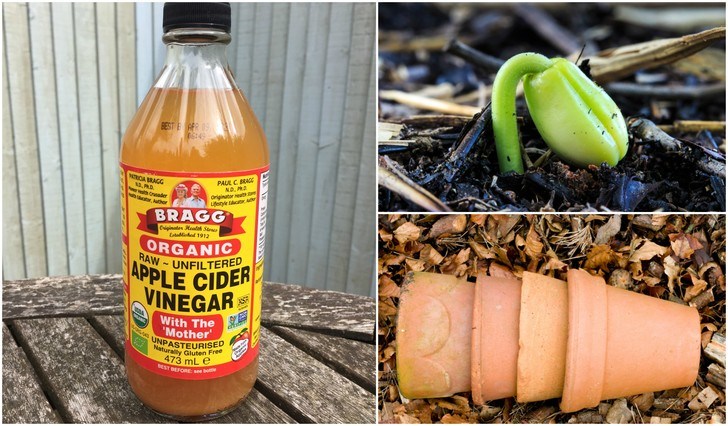
As you probably know by now, apple cider vinegar has what seems like about a gazillion different benefits and uses. In fact, it’s practically become an obsession for many. You may even already be using it in the morning as part of a drink for its burst of energy and other health benefits. It’s effective for just about anything, from your skin and hair to your home and more. But did you know that it’s even useful in the garden?
That’s right – you can even use that bottle of ACV in your garden, which means it may be time to stock up, or at least start getting a much larger container.
Here are just some of apple cider vinegar’s most brilliant uses for your garden.
1. ACV as a fertilizer
While white vinegar is often used as a herbicide, apple cider vinegar has the opposite effect due to its 5 percent acidity. It can be used as a fertilizer to maintain healthy plants, although as it is acidic, you’ll want to utilize it for plants that thrive in more acidic soil, like azaleas, gardenias and blueberry bushes.
To do so, add 10 ounces of raw, unfiltered organic apple cider vinegar into a 10-gallon bucket, and then fill the remainder with water. The ratio, in general, is one ounce of ACV for every 1 gallon of water, although it does not have to be exact. The main thing is to water down the apple cider vinegar so that it isn’t so strong that it harms the soil or the plants. Pour the water/ACV mixture on the soil and around the roots, using a sprayer or watering can, of each plant you want to fertilize. Keep in mind that although the ACV is diluted, it is still acidic, which means it could potentially wilt any parts of plants it touches if the sun is out.
You can use ACV as your regular fertilizer, or alternate it with another natural fertilizer. It’s important to use unfiltered organic apple cider vinegar, as the pulp is what contains the greatest amount of nutrients, and buying organic means you won’t be adding residual pesticides and herbicides to your garden.
2. Get rid of those annoying fruit flies
You can help protect your fruits and fruit trees, while also preventing those annoying fruit flies from entering your home, by making a fruit fly deterrent using apple cider vinegar. To make it, all you need is a half-cup of apple cider vinegar, a quarter-cup of sugar, a tablespoon of molasses, 1 cup of water, some empty, cleaned tin cans and sturdy string or wire. Mix everything together in a bowl or other container and then pour it into your tin cans (be sure they’re cleaned thoroughly first). Hang the cans in your fruit trees – the “bait” attracts the fruit flies that love fermenting fruit as it replicates that scent and traps them before they have a chance to reproduce. Maintain the bait as necessary, removing abundant dead fruit flies and refilling the container with the vinegar mixture. Ensure the trap is at the level where fruit develops if you hang it too low on the tree will not be as effective.
If fruit flies have already made their way into your kitchen or other areas of the home, you can use this some method to get rid of them there too.
3. Clean up rusty garden tools
Rust is the result of a chemical reaction referred to as iron oxide. It appears when the iron in tools is exposed with oxygen in the presence of water. Therefore, if your garden tools are exposed to damp conditions, it can harm them over time, which is why it’s so important to keep them away from moisture. The good news is that apple cider vinegar can help if you run into rust problems. All you have to do is put it into a spray bottle and spray your tools with it. If you’ve got a really bad rust problem, let your tools soak in pure ACV for about a day in a bucket or other large container, making sure they’re totally covered. When you remove the tools from the bucket, the rust will wipe right off. Just be sure to wash them down once the rust is removed and then dry them thoroughly so that the area the tools are stored in doesn’t end up smelling like fish ‘n’ chips, and the rust doesn’t return.
4. Keep common pets out of your garden
Animals that love to get in your garden, like raccoons, rabbits, moles, rodents, deer and the like, also happen to hate the smell of vinegar, so it will keep them out naturally without causing them harm. All you have to do is soak a few rags in your apple cider vinegar and place them strategically throughout your garden. Re-soak them once a week to ensure they retain their maximum effectiveness.
You can also use ACV to get rid of slugs and snails, it just takes a little more work. That’s because these plant-loving creatures prefer moving around at night when it’s cooler, so you need to be sneaky to get them. To do so, you’ll need a board and a stick. Prop up the board using the stick in your garden, which creates shelter from the sun that they’ll use to gather under during the day. Once they’ve congregated there, you can spray them with apple cider vinegar, which dissolves them. Just be careful not to spray any areas of the yard or garden you don’t want to kill in the process.
For insects that like to munch on your plants, you’ll need to dilute ACV first so that it doesn’t harm the leaves. Add 3 parts water to 1 part ACV in a spray bottle, and then add a teaspoon of dish soap. Spray the solution on the leaves of the plant’s insects enjoy dining on. You can also use it to control ants by spraying ACV undiluted on ant hills – again, be sure that no plants get in the way.
5. Clean clay pots
Clay pots are fabulous to have in your garden as they help to keep the soil cool during the hot summer months, while allowing the plants to breathe, and they’re attractive too. But as they age, they absorb calcium and other minerals from the water and end up discolored. While you might think you have to live with it or buy new ones, thankfully, you can use vinegar to clean them up. To do so, scrub off any loose dirt first and then soak the pot in a mixture of 4 cups water and one cup of vinegar. After the pot has soaked in vinegar, soak it again in plain water and it will be as good as new. If there are any really tough spots, you can spray undiluted vinegar on them and then scrub until they’re removed.
6. Acidify your soil
As some plants prefer more acidic soil, you can also use apple cider vinegar to naturally adjust the pH level of your soil without the need for expensive and harsh commercially produced products. Soil with a pH that ranges from 1 to 6 is considered acidic, and while most plants require a pH between 6.5 and 7, others need those more acidic conditions – test your soil first to determine its precise pH before amending it with ACV. If it needs to be more acidic, mix together a gallon of water with a cup of ACV in a watering can and then pour it over the soil. Be sure to check the pH regularly to ensure that the ACV didn’t make the soil too acidic.
How To Get A Free Bottle Of Apple Cider Vinegar
If you’ve read this article in full, or any of our other apple cider vinegar articles, then you are probably desperate to get your hands on a bottle – but to experience the magnificent benefits, it’s important you choose the right one.
When buying apple cider vinegar it is imperative to choose a bottle that is organic, non-GMO, unpasteurized, raw and unfiltered containing “the Mother” – a combination of enzymes, proteins and probiotic bacteria.
 Bragg Apple Cider Vinegar has generally been the most popular brand for many years and still remains one of the best bottles of ACV you can buy, but recently the team at Thrive Market (our favorite place to buy natural products and healthy foods at 25-50% off retail price) have created their own non-GMO, organic, raw, unpasteurized and unfiltered ACV with “the Mother” – and they want to send you a free bottle.
Bragg Apple Cider Vinegar has generally been the most popular brand for many years and still remains one of the best bottles of ACV you can buy, but recently the team at Thrive Market (our favorite place to buy natural products and healthy foods at 25-50% off retail price) have created their own non-GMO, organic, raw, unpasteurized and unfiltered ACV with “the Mother” – and they want to send you a free bottle.
Simply click this link and your free bottle of Thrive Market Apple Cider Vinegar will be added to your basket. Just add $29 worth of goods to your basket to qualify for the free ACV.
Thrive Market is a relatively new online marketplace selling wholesome products at wholesale prices. They sell the best in healthy foods and natural products from the most popular ethical brands, but with one difference… everything they sell is typically 25-50% off retail price.
If you often find yourself buying natural health and beauty products, non-toxic home supplies, wholesome foods and more, then you’ll quickly see how much you can save by shopping at Thrive Market.
